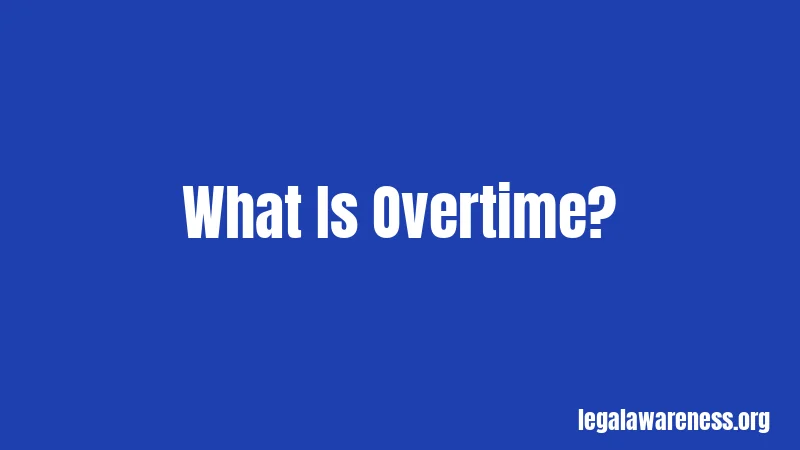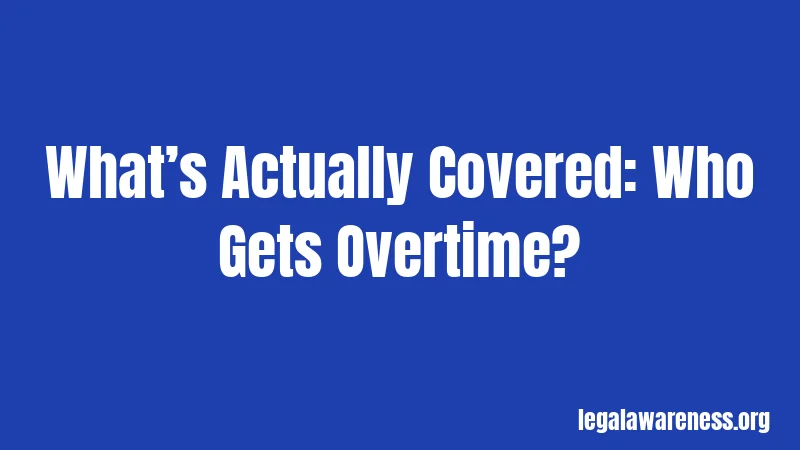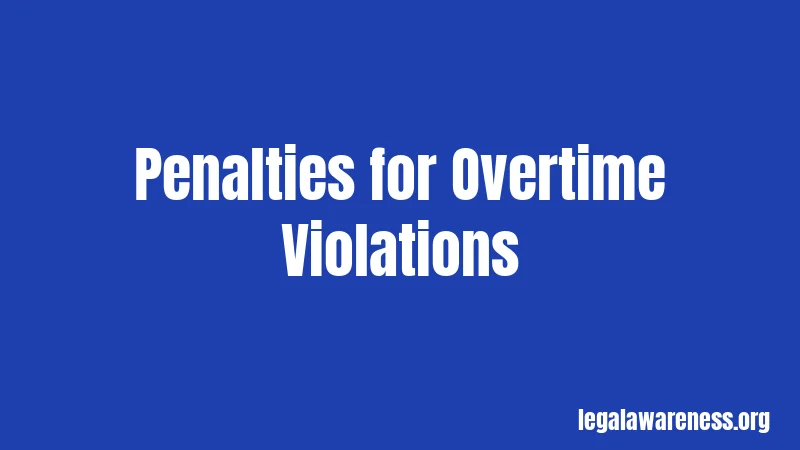Overtime Laws in Washington (2026): Your Complete Guide
Most workers have no idea how much overtime protection Washington state actually gives them. Seriously. The rules here are some of the strictest in the country, and they apply to way more people than you’d think. If you work in Washington, you need to know your rights. Employers need to follow these laws carefully, or they’ll face real consequences.
Here’s what matters most: Washington has its own overtime rules that often go further than federal law. That means you might be entitled to overtime pay even in situations where federal rules wouldn’t require it. Let’s break down exactly what you need to know.
What Is Overtime?

Overtime is simply extra pay for working extra hours. In Washington, it’s not optional. Think of it like this: your employer owes you a higher rate of pay when you work beyond certain limits each week.
Washington’s overtime laws protect employees by requiring employers to pay premium wages for long work hours. This applies to most workers, from retail employees to nurses to construction workers. The goal is straightforward: compensate people fairly for the extra time they give.
Washington’s Overtime Rules: The Basics
The 1.5x Rule (Time and a Half)
Here’s where it gets simple. In Washington, you must earn overtime pay at 1.5 times your regular rate for hours worked over 40 in a week. That’s the baseline rule. One week, 40 hours regular time. Anything beyond that? You’re getting paid extra.
So if you make $15 per hour, overtime pay is $22.50 per hour. Confused about the difference? It’s straightforward: this rule applies to almost all employees. Your employer can’t get around it by calling you a “manager” or saying you’re salaried. If you work over 40 hours in a week, you get overtime.
Special Rules for Certain Industries
Wait, it gets better. Washington has extra protections for specific jobs. For healthcare workers, domestic workers, and certain agricultural employees, there are unique rules. These workers sometimes qualify for overtime rules that are even stricter than the standard 40-hour rule.
Okay, pause. Read this carefully. Agricultural workers in Washington have their own overtime protections, though some exemptions exist for family farms. Domestic workers, including housekeepers and home healthcare aides, are entitled to overtime under Washington law. This matters because these industries were historically left out of federal overtime protections.
Minimum Wage and Overtime
Here’s where things connect. Washington has one of the highest minimum wages in the nation. For 2026, the state minimum wage is $16.28 per hour. This minimum applies to overtime calculations too. You can’t earn less than 1.5 times the minimum wage for overtime hours, period.
That means your overtime rate is never lower than $24.42 per hour, no matter what your regular rate is. This protects workers who might otherwise earn very low overtime pay.
What’s Actually Covered: Who Gets Overtime?

This is important. You’re probably thinking you’re covered. You’re right. Most Washington workers are entitled to overtime pay. But there are exceptions, and knowing them matters.
Salaried employees, hourly employees, contractors who work as regular employees, and commission workers all get overtime protection. The key word is “employee.” If your employer treats you as an employee (not an independent contractor), Washington’s overtime laws apply.
A few groups are exempt from overtime. These include certain managers, professionals, computer programmers, outside salespeople, and a few other specific categories. But here’s the catch: just calling someone a “manager” doesn’t make them exempt. The rules are strict about this.
Independent Contractors vs. Employees
Not sure what counts as a violation? Let me break it down. Washington has a test to determine if you’re truly an independent contractor or actually an employee. Courts look at three factors: control over the work, whether the job is central to the business, and whether the worker invests in equipment or tools.
If your employer controls how you work, when you work, and where you work, you’re probably an employee. That means overtime rules apply. Many companies misclassify workers as contractors to avoid paying overtime. If that’s you, don’t assume it’s legal.
Recent Changes and Updates
Sound complicated? It’s actually not. Washington has been making updates to protect workers even more. In recent years, the state has expanded overtime rules and strengthened enforcement. Some industries that previously had exemptions have seen those exemptions shrink.
I looked this up recently. The rules surprised me. They might surprise you too. Washington’s Department of Labor and Industries watches for violations carefully. Employers who break these rules face penalties that sting.
Penalties for Overtime Violations

Let’s talk about what happens when employers break the law. Washington doesn’t mess around here. If an employer fails to pay overtime wages, you can recover not just the unpaid overtime but also penalties on top.
You’re entitled to recover the unpaid wages plus an equal amount as a penalty. Yes, that’s right. Break the overtime law, and the penalty doubles what the employer owes. If you were owed $5,000 in overtime, your penalty recovery is another $5,000. That’s $10,000 total.
On top of the money damages, employers also owe attorney’s fees and costs if you sue. This makes it worthwhile to challenge violations, even smaller ones. Some employers pay lawyers less than they owe workers just to settle.
Additionally, the state can fine employers. The Department of Labor and Industries can pursue violations independently. Fines can reach thousands of dollars per violation, and violations can be repeat violations if the employer keeps breaking the law.
Civil Penalties
Washington law allows the state to fine employers up to $13,500 per violation for overtime infractions (as of 2025, adjusted annually). Think of it like a traffic ticket, but much more serious. Multiple violations stack up quickly.
Honestly, this is the part most employers miss. They think fixing it quietly is cheaper. Usually, it’s not. Once the state or a worker’s lawyer gets involved, costs explode.
Calculating Overtime Pay: Step by Step
Okay, let’s work through an example. Say you earn $18 per hour and work 45 hours in a week. Five hours are overtime. Your calculation looks like this: regular pay is $18 per hour times 40 hours equals $720. Overtime pay is $27 per hour (1.5 times $18) times 5 hours equals $135. Total for the week: $855.
Easy? Pretty straightforward. But what if you work on commission or earn tips? The math gets trickier. Washington requires that commissions and tips be included in your regular rate for overtime calculations. Your overtime rate must be at least 1.5 times your total compensation per hour.
Here’s where it gets interesting. If you earn bonuses, piece-rate pay, or other forms of compensation, those count too. Employers can’t calculate overtime on just your base wage. Everything counts.
Including Bonuses and Special Pay
Not sure what counts toward your regular rate? Let me explain. Pretty much any compensation you receive counts. Commissions, bonuses, shift differentials, and hazard pay all factor into your overtime calculation.
There are a few narrow exceptions for certain types of bonuses. Discretionary bonuses that aren’t promised don’t count. But if your employer regularly gives bonuses, or promised you one, they’re included.
Special Circumstances and Exceptions
The rules are strict. But a few situations create exceptions or special handling. Knowing them helps you understand your rights better.
Executive and administrative employees sometimes have exemptions. But again, the state watches these closely. You can’t just call someone an “executive” to avoid paying them overtime. Washington’s test is strict: does the employee actually spend most of their time doing executive or administrative work? Do they have real authority to make decisions? If not, they’re not exempt.
Seasonal and Agricultural Workers
Agricultural work has different rules. Many farm workers are entitled to overtime, though family farm operations sometimes qualify for exemptions. Seasonal workers generally get overtime protections, but the rules vary depending on the type of work and employer size.
Many people assume this is legal. They find out the hard way. Agricultural employers who misclassify workers or avoid overtime pay face significant liability.
Salaried Employees
You might think being salaried means no overtime. Wrong. In Washington, salaried employees get overtime if they work over 40 hours per week. Your salary doesn’t matter. The only question is whether you’re exempt based on your actual job duties.
A true exempt employee must earn at least $1,395 per week (adjusted annually for inflation) and perform duties that truly qualify for exemption. Most salaried workers don’t meet the exemption requirements.
How to Calculate Your Hours
Here’s something important. Your employer must track all hours you work. Every minute counts. That includes time spent on emails, training, meetings, travel between job sites, and any other work-related activity.
Time you spend working but not getting paid is still counted for overtime purposes. If your employer lets you work off the clock, that time still counts. You can’t waive your right to overtime pay. Your employer can’t ask you to skip recording hours. It’s illegal.
Keep your own records too. Take screenshots of time logs. Write down your hours. If disputes happen, your records matter.
What About Holidays, Vacation, and Other Time Off?
Sound complicated? It’s actually straightforward. Holiday hours and vacation hours don’t count toward your 40-hour threshold for overtime calculation. Only hours you actually work count.
So if you work 35 hours and take 5 hours of vacation in a week, you owe no overtime. The overtime calculation is based solely on hours worked, not total hours paid.
This matters because some employers mistakenly think they can count paid time off toward the 40-hour limit. They can’t. You only owe overtime for actual work hours.
How to Report Violations
Think your employer owes you overtime? Here’s what you should do. First, request payment in writing. Document everything. Keep copies of communications, pay stubs, and time records.
If your employer won’t pay, you have options. File a wage complaint with Washington’s Department of Labor and Industries. It’s free, and you don’t need a lawyer to start. The state will investigate.
You can also file a lawsuit. Washington allows employees to sue for unpaid wages. And here’s the good news: if you win, your employer pays your attorney’s fees. That means you can hire a lawyer for free (they get paid from the award).
Going to the Department of Labor
Filing a complaint with the Department of Labor and Industries is usually the first step. You can file online or by mail. Include your pay stubs, time records, and any communications from your employer. The state will contact your employer and investigate.
This process is free. No filing fees. The state does the heavy lifting. Many employers settle quickly when they realize the state is involved.
Legal Action
If the Department doesn’t resolve things, or if you prefer, you can sue. Washington allows class action lawsuits for wage violations. That means if your employer owes multiple workers, you can sue together.
The state even provides funding for legal aid in some cases. Contact your local legal aid organization to see if you qualify for free legal help.
Frequently Asked Questions
Does my employer have to pay overtime for 4-hour shifts that total over 40 hours a week?
Yes. If you work multiple shifts in a week and total over 40 hours, you owe overtime on the hours beyond 40. The number of daily shifts doesn’t matter. Only the weekly total matters.
Can my employer require me to work overtime?
Yes, in most cases. Your employer can require overtime. However, you must be paid overtime rates for those hours. They can’t require overtime without compensation.
Do I get overtime if I’m paid a salary?
Usually yes. Salaried employees get overtime if they work over 40 hours per week, unless they qualify for a specific exemption. Your salary doesn’t prevent overtime rights.
What if my employer says I have to waive overtime?
You can’t waive overtime. It’s illegal. Any agreement you make to waive overtime is unenforceable. You automatically owe overtime no matter what you agreed to.
How far back can I claim unpaid overtime?
You can typically claim unpaid overtime going back three years. But don’t wait. File a complaint as soon as you realize you’re owed money. The longer you wait, the more evidence might disappear.
Can my employer average hours over several weeks?
No. Washington calculates overtime week by week. Your employer can’t average hours over two weeks to avoid paying overtime. Each week stands alone.
What about tips and commission in my overtime calculation?
Both count. Tips and commissions are part of your regular rate. Your employer must include them when calculating overtime pay. You might earn more overtime than you thought.
Does my employer owe overtime for mandatory meetings?
If the meeting is work-related and you must attend, yes, it counts. Attendance is required, so it’s work time. You owe overtime if you work over 40 hours total that week.
Final Thoughts
Now you understand Washington’s overtime laws. They’re protective, strict, and designed to keep employers honest. If you work over 40 hours per week, you deserve premium pay. Period.
Your rights are strong in Washington. Use them. If you think you’re owed overtime, take action. The system is set up to help you. File a complaint, gather your documents, and stand up for fair pay.
And remember: you can’t waive these rights. No agreement makes them go away. Stay informed, keep your own records, and when in doubt, ask a lawyer or contact the Department of Labor. You’ve got this.
References
Washington State Department of Labor and Industries: https://www.lni.wa.gov/workers-rights/wages-hours/
Washington Revised Code Chapter 49.46 (Wages): https://app.leg.wa.gov/rcw/default.aspx?cite=49.46
Minimum Wage Information: https://www.lni.wa.gov/workers-rights/wages-hours/minimum-wage/
Wage and Hour Division Information: https://www.dol.gov/agencies/whd/
File a Wage Complaint: https://www.lni.wa.gov/workers-rights/wages-hours/file-complaint/
Legal Aid Washington: https://nwjustice.org/get-legal-help
